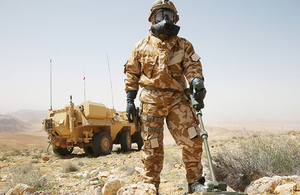UK at Forefront of Ridding the World of Chemical Weapons
More than 105 delegates representing 53 organisations and 13 countries attended a unique gathering of chemical weapons demilitarisation specialists in London in May.

Hosted by the Defence Science and Technology Laboratory (Dstl) on behalf of the Ministry of Defence, the annual Chemical Weapons Demilitarisation Conference is the only regular forum of international chemical weapons demilitarisation experts.
The gathering included the Director-General and key staff of the Technical Secretariat of the Organisation for the Prohibition of Chemical Weapons (OPCW), the international body responsible for the Chemical Weapons Convention, which provides a near global ban on chemical weapons. Lord Howe, Minister of State for Defence, gave a keynote speech. Participants included representatives spanning government, armed forces, industry, academia, and research and development establishments. The Conference aims to develop and share scientific and technical knowledge and expertise, and to promote collaborative working to complete the world-wide elimination of chemical weapons.
Jeff Garrett, Head of Global Issues at the Ministry of Defence, said:
The repeated use of chemical weapons in recent years clearly demonstrates that the threat from chemical weapons has not gone away. The effective application of scientific and technical advances remains as important as ever to ensuring the completion of destruction of existing chemical weapons, and reliable and effective verification. The Conference provided an excellent vehicle for bringing together representatives from across the chemical weapons demilitarisation community. The high turnout for the Conference demonstrates its continued relevance to addressing the challenges that lie ahead.
The UK continues to be at the forefront of the global fight to eliminate chemical weapons, including in the key area of science and technology. The UK laboratory at Dstl is designated by the OPCW for analysis of chemical samples, and is accredited to analyse environmental and biomedical samples to the highest international standards. The UK, including Dstl, provides extensive support to the OPCW. In April 2019, the UK contributed £1.1 million to support the activities of the OPCW, including support for the OPCW’s planned new Centre for Chemistry and Technology, support for aspiring analytical laboratories in Africa and Latin America, and provision of assistance to countries in East and West Africa to help improve their capability to respond to chemical weapon attacks, as well as support for the OPCW’s work to tackle use of chemical weapons in Syria. This major new financial contribution complements the UK’s and Dstl’s longstanding technical and financial support to the OPCW, which has included specialist inspector training, and training in analytical chemistry and the chemistry of scheduled chemicals, in addition to support through the Designated Laboratory system.
This year’s Conference - the 22nd in the series - featured 38 speakers covering progress on chemical weapons destruction and advances in technology. The wide-ranging programme included: location and disposal of chemical weapons in hostile environments; advances in portable and static destruction technologies; remote monitoring in unsafe environments; public information; environmental impacts; and aerial surveys.
The Conference received updates on the global progress to eliminate chemical weapons worldwide. These programmes are moving into their final stages, with only a few percent of declared stockpiles, which dated back to the Cold War, still to be destroyed. In total, some 70,000 tonnes - more than 97% - of the more than 72,000 tonnes of chemical weapon agent declared by 8 states have been destroyed since the Chemical Weapons Convention came into force in 1997.
Work is ongoing to recover and destroy chemical weapons that were abandoned in China in World War 2. In addition, each year many old chemical weapons, produced during or before World War 2, are found and destroyed in locations across the globe.
In recent years, the OPCW has verified the destruction of declared chemical weapon production facilities in Iraq and declared chemical weapons from Libya and Syria. New and different approaches were required in each case, including removal of the chemicals from the possessor state for destruction in more secure environments, in industrial facilities. New technologies have been used to verify destruction remotely, and the requirement for these is expected to grow.
The CWD Conference seeks to bring together those who have identified the requirement to address new challenges, and those who can provide the necessary technical solutions. Future conferences will increasingly focus on these areas. In this context, the UK, jointly with the US, is funding the “Don’t Blow It!” competition, to address such new challenges by developing novel and innovative technologies to access, disable or destroy chemical and biological weapons, bulk agents, and precursor materials in austere and resource-limited environments. Projects being developed include remote robotic treatment and man-portable destruction technologies.
Gary Aitkenhead, Chief Executive of Dstl, said:
As the elimination of declared global stockpiles of chemical weapons is almost complete, our focus must now be on developing a toolkit for the expedient elimination of smaller caches. Non-state actors have developed battlefield capabilities that we have previously thought of as being only within reach of state-level programmes. It is vital that we continue to provide technical solutions and fundamental that we improve the ability to deploy rapidly.
Planning for the 2020 Conference is already underway. For further information contact cwdconference@dstl.gov.uk